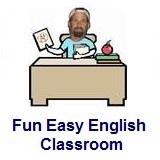|
|
| |
|
|
| |
|
|
| Fun Easy English Classroom April 3 |
|
| |
Classroom
Today
Learn about
English
relative pronouns |
|

Today in the Fun Easy English classroom you are going to learn about
relative pronouns an important part of English
grammar. |
 Hey
if you cannot understand something on this page, Hey
if you cannot understand something on this page,
then use the Fun Easy English
dictionary
(opens in a new window) |
|
|
|
 Grammar:
Relative
Pronouns Grammar:
Relative
Pronouns
Definition of a
relative pronoun. |
|
|
- You may eat whatever you like at the
restaurant.
- You may ask whomever you want.
- The following words are relative pronouns
- what, which, who, whom, that, whatever, whichever, whoever,
whomever
|
|
 From
YOUR Teacher: Relative
Pronouns From
YOUR Teacher: Relative
Pronouns
Relative pronouns are words which connects a phrase or
clause to another phrase or clause.
You may eat anything on the menu
you like, becomes, You may eat whatever
you like.
Whatever replaces
eat anything on the menu. |
|
|
|
|
|
Additional Lessons |
 About These
Lessons About These
Lessons
The following classroom lessons are great for students
who want additional conversation, listening, and reading
practice. |
-
Conversation Lesson -
Beginner Level. Dialogs for everyday use.
Short situational dialogs for students of English as
a Foreign (EFL) or Second (ESL) Language with a
written conversation and a conversation notes
section.
|
 Conversation Lesson
11 - Mistakes Conversation Lesson
11 - Mistakes
(Beginner -
Conversation, Reading)
Dialogs for everyday use. Short situational dialogs for
students of English as a Foreign (EFL) or Second (ESL)
Language. |
Mistakes
Bruce: Where did John go?
Laura: He went to the
drugstore.
Bruce: To the bookstore?
Laura: No, I said he went to the
drugstore.
Bruce: Oh, I misunderstood you. I thought you said bookstore.
Laura: How could you make a mistake like that? Weren’t you
paying attention? |
|
Conversation Notes |
- drugstore
- Since this is a compound noun, the principal stress is
on the first syllable.
- To the bookstore
- This is a normally shortened form for Did you say he
went to the bookstore?—with the omitted words “understood.” Bookstore. This
word, a compound noun, has the principal stress on the first syllable.
- drugstore
- Note there is heavy stress and slightly higher than
usual intonation on drug, to emphasize this syllable, as contrasted with
book in the line above.
- How could you make a mistake like that? Weren’t you
paying attention?
- Note there is a difference in intonation between the
how question and the yesno
question.
|
|
Source: U.S. State Department |
|
Additional Conversation |
 Conversation Conversation
This is a collection of 36 situational conversations
which focus on spoken American English in a relatively
natural way....these
lessons are for intermediate students. |
 Conversation Conversation
This is a collection of 30 situational conversations. Each conversation is
accompanied by language notes....these
lessons are for advanced students. |
 Conversation Conversation
English conversation lessons. 52
lessons covering pronunciation, speaking,
writing, and grammar topics....these
lessons are for beginning students. |
 Conversation Conversation
English conversation lessons. 30
lessons focusing mostly on communication and
grammar topics....these
lessons are for intermediate students. |
|
|
|
|
|
|
|
 Hey Students, Hey Students,
Use this dictionary and reference to look up any words you do not
understand in Fun Easy English.
Note: search opens in a new tab. |
|
|
|
|
|
Search Fun Easy English |
|
|
|
|
|
|
|
|
|
|
|
|
|
|
|
About
Contact
Copyright
Resources
Site Map |